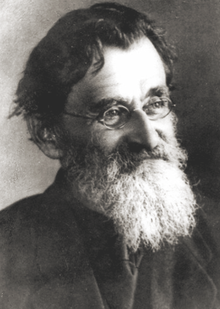Feliks Kon
| Feliks Kon Феликс Яковлевич Кон |
|
|---|---|
 |
|
| Leader of Communist Party (Bolsheviks) of Ukraine temporarily |
|
|
In office March 22, 1921 – December 14, 1921 |
|
| Preceded by | Vyacheslav Molotov |
| Succeeded by | Dmitriy Manuilsky |
| Personal details | |
| Born |
May 18, 1864 Warsaw, Russian Empire |
| Died | July 28, 1941 (aged 77) Moscow, Soviet Union |
| Nationality | Polish |
| Alma mater | University of Warsaw |
Feliks Yakovlevich Kon (May 18, 1864 – July 30, 1941) was a Polish communist activist.
Born in Warsaw, Kon's mother was Georgian Jewish and was brought up in Russia. He was trained as a historian and a journalist, but was involved in politics. He had limited knowledge of Polish affairs at first, but intuitively felt the revolutionary element among Polish workers that he could mobilize.
He was a member of the anti-Piłsudski faction of the Polish Socialist Party. Kon gravitated towards the anti-independence, pro-communism point of view. In January 1897 an administrative decision was at last taken to banish him. He was exiled to Irkutsk and began working on the progressive newspaper "Vostochnoye Obozrenie" (Eastern Review).
As the Bolsheviks began to prepare for the Polish-Soviet War, they summoned an increasing number of Polish communists, active elsewhere in Soviet service, to Moscow in order to form a cadre of party and state officials to move into ethnographic Poland with the Red Army. He was put on the Provisional Polish Revolutionary Committee (formed in Białystok on July 30, 1920 - dissolved August 20, 1920) during the Polish-Soviet War.
During this period he was editor-in-chief of the Goniec Czerwony newspaper, the official organ of the temporary revolutionary committee. The first issue appeared on August 7. Its purpose was to agitate and it printed all the appeals issued by the Communist puppet government, as well as distinctly skewed news from the war. Twelve issues appeared, the last on August 20 as the Polish army approached the city. In the last issue he triumphantly proclaimed in an article entitled "Dwa światy" (Two Worlds): The old world disappears, but a new one is born: great, powerful and a genuinely independent Polish Socialist Republic will hold the prominent post in this world.
...
Wikipedia
